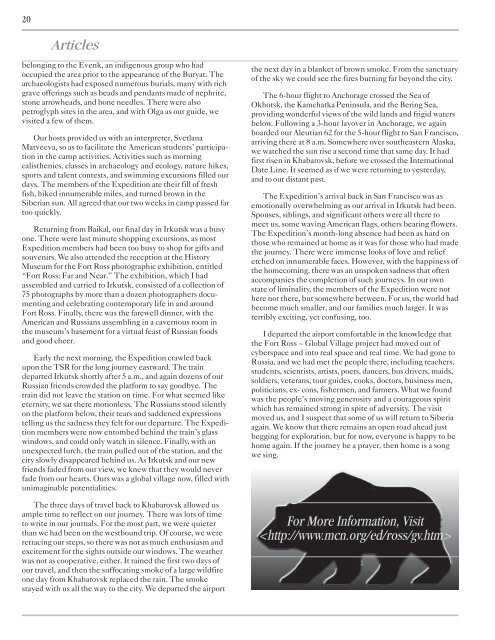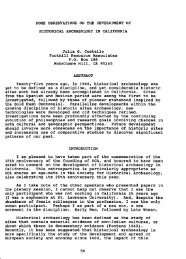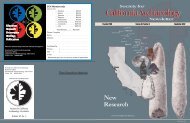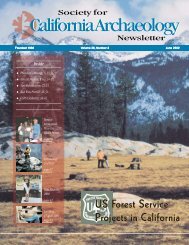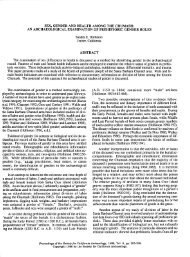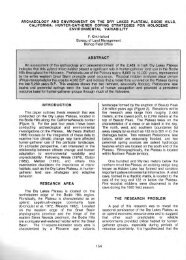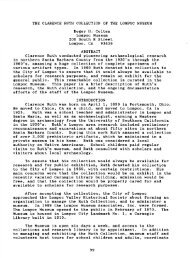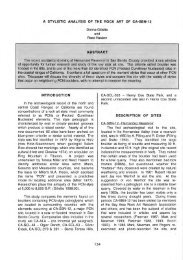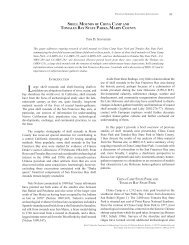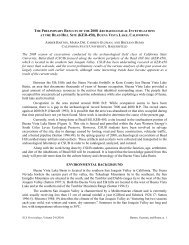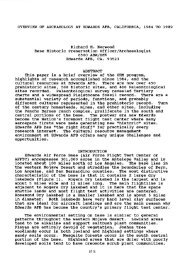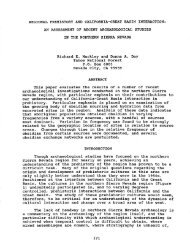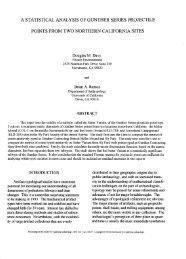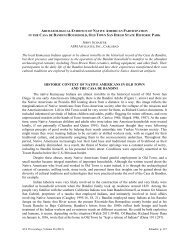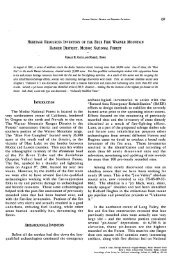March 1999 - Society for California Archaeology
March 1999 - Society for California Archaeology
March 1999 - Society for California Archaeology
Create successful ePaper yourself
Turn your PDF publications into a flip-book with our unique Google optimized e-Paper software.
20<br />
Articles<br />
belonging to the Evenk, an indigenous group who had<br />
occupied the area prior to the appearance of the Buryat. The<br />
archaeologists had exposed numerous burials, many with rich<br />
grave offerings such as beads and pendants made of nephrite,<br />
stone arrowheads, and bone needles. There were also<br />
petroglyph sites in the area, and with Olga as our guide, we<br />
visited a few of them.<br />
Our hosts provided us with an interpreter, Svetlana<br />
Matveeva, so as to facilitate the American students’ participation<br />
in the camp activities. Activities such as morning<br />
calisthenics, classes in archaeology and ecology, nature hikes,<br />
sports and talent contests, and swimming excursions filled our<br />
days. The members of the Expedition ate their fill of fresh<br />
fish, hiked innumerable miles, and turned brown in the<br />
Siberian sun. All agreed that our two weeks in camp passed far<br />
too quickly.<br />
Returning from Baikal, our final day in Irkutsk was a busy<br />
one. There were last minute shopping excursions, as most<br />
Expedition members had been too busy to shop <strong>for</strong> gifts and<br />
souvenirs. We also attended the reception at the History<br />
Museum <strong>for</strong> the ort Ross photographic exhibition, entitled<br />
“ort Ross: ar and Near.” The exhibition, which I had<br />
assembled and carried to Irkutsk, consisted of a collection of<br />
75 photographs by more than a dozen photographers documenting<br />
and celebrating contemporary life in and around<br />
ort Ross. inally, there was the farewell dinner, with the<br />
American and Russians assembling in a cavernous room in<br />
the museum’s basement <strong>for</strong> a virtual feast of Russian foods<br />
and good cheer.<br />
Early the next morning, the Expedition crawled back<br />
upon the TSR <strong>for</strong> the long journey eastward. The train<br />
departed Irkutsk shortly after 5 a.m., and again dozens of our<br />
Russian friends crowded the plat<strong>for</strong>m to say goodbye. The<br />
train did not leave the station on time. or what seemed like<br />
eternity, we sat there motionless. The Russians stood silently<br />
on the plat<strong>for</strong>m below, their tears and saddened expressions<br />
telling us the sadness they felt <strong>for</strong> our departure. The Expedition<br />
members were now entombed behind the train’s glass<br />
windows, and could only watch in silence. inally, with an<br />
unexpected lurch, the train pulled out of the station, and the<br />
city slowly disappeared behind us. As Irkutsk and our new<br />
friends faded from our view, we knew that they would never<br />
fade from our hearts. Ours was a global village now, filled with<br />
unimaginable potentialities.<br />
The three days of travel back to Khabarovsk allowed us<br />
ample time to reflect on our journey. There was lots of time<br />
to write in our journals. or the most part, we were quieter<br />
than we had been on the westbound trip. Of course, we were<br />
retracing our steps, so there was not as much enthusiasm and<br />
excitement <strong>for</strong> the sights outside our windows. The weather<br />
was not as cooperative, either. It rained the first two days of<br />
our travel, and then the suffocating smoke of a large wildfire<br />
one day from Khabarovsk replaced the rain. The smoke<br />
stayed with us all the way to the city. We departed the airport<br />
the next day in a blanket of brown smoke. rom the sanctuary<br />
of the sky we could see the fires burning far beyond the city.<br />
The 6-hour flight to Anchorage crossed the Sea of<br />
Okhotsk, the Kamchatka Peninsula, and the Bering Sea,<br />
providing wonderful views of the wild lands and frigid waters<br />
below. ollowing a 3-hour layover in Anchorage, we again<br />
boarded our Aleutian 62 <strong>for</strong> the 5-hour flight to San rancisco,<br />
arriving there at 8 a.m. Somewhere over southeastern Alaska,<br />
we watched the sun rise a second time that same day. It had<br />
first risen in Khabarovsk, be<strong>for</strong>e we crossed the International<br />
Date Line. It seemed as if we were returning to yesterday,<br />
and to our distant past.<br />
The Expedition’s arrival back in San rancisco was as<br />
emotionally overwhelming as our arrival in Irkutsk had been.<br />
Spouses, siblings, and significant others were all there to<br />
meet us, some waving American flags, others bearing flowers.<br />
The Expedition’s month-long absence had been as hard on<br />
those who remained at home as it was <strong>for</strong> those who had made<br />
the journey. There were immense looks of love and relief<br />
etched on innumerable faces. However, with the happiness of<br />
the homecoming, there was an unspoken sadness that often<br />
accompanies the completion of such journeys. In our own<br />
state of liminality, the members of the Expedition were not<br />
here nor there, but somewhere between. or us, the world had<br />
become much smaller, and our families much larger. It was<br />
terribly exciting, yet confusing, too.<br />
I departed the airport com<strong>for</strong>table in the knowledge that<br />
the ort Ross ~ Global Village project had moved out of<br />
cyberspace and into real space and real time. We had gone to<br />
Russia, and we had met the people there, including teachers,<br />
students, scientists, artists, poets, dancers, bus drivers, maids,<br />
soldiers, veterans, tour guides, cooks, doctors, business men,<br />
politicians, ex- cons, fishermen, and farmers. What we found<br />
was the people’s moving generosity and a courageous spirit<br />
which has remained strong in spite of adversity. The visit<br />
moved us, and I suspect that some of us will return to Siberia<br />
again. We know that there remains an open road ahead just<br />
begging <strong>for</strong> exploration, but <strong>for</strong> now, everyone is happy to be<br />
home again. If the journey be a prayer, then home is a song<br />
we sing.<br />
For More In<strong>for</strong>mation, Visit<br />


